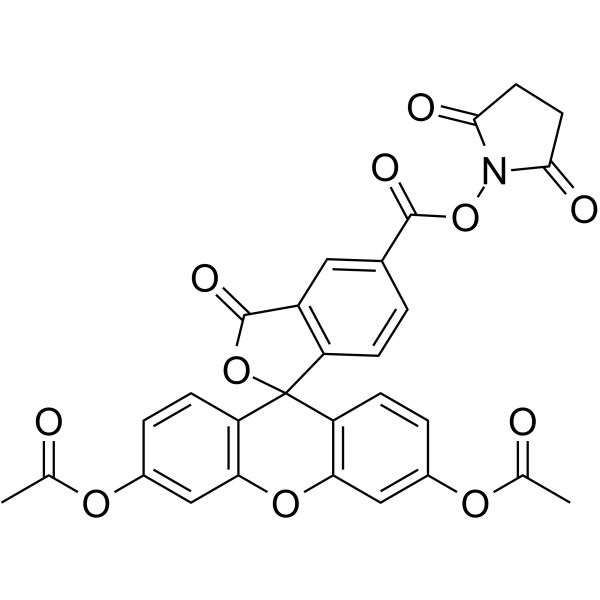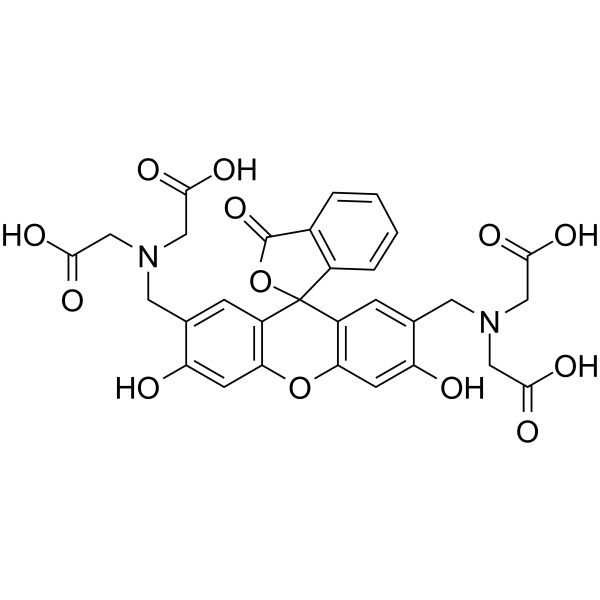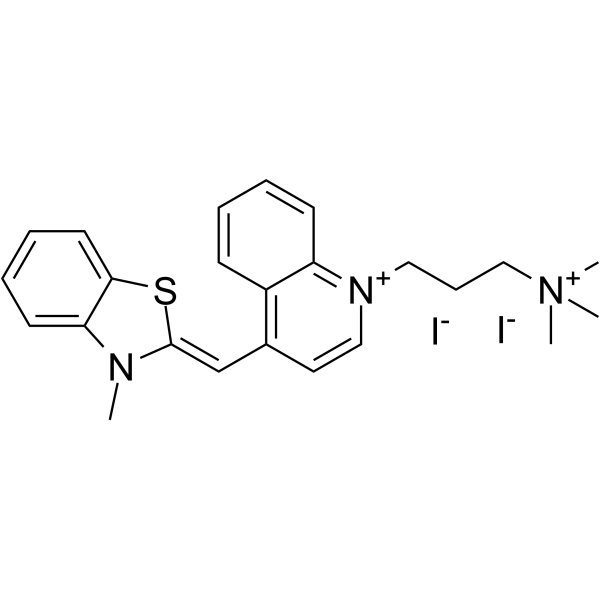Dyes, Stains & Indicators
Products for Dyes, Stains & Indicators
- Cat.No. Product Name Information
-
GC42057
2,3,3-Trimethylindolenine-5-sulfonic Acid (potassium salt)
2,3,3-Trimethylindolenine-5-sulfonic Acid is a water soluble, fluorescent near-infrared dye that can be conjugated to peptides, proteins, nucleic acids, RNA, DNA, carbohydrates, polymers, and small molecules via a sulfonyl substituent.

-
GC42077
2,6-Dibromoquinone-4-chloroimide
NSC 528
2,6-Dibromoquinone-4-chloroimide is a colorimetric dye for the detection of phenolic compounds.
-
GC49272
2-Chloro-4-nitrophenyl α-D-maltotrioside
CNP-G3
A colorimetric α-amylase substrate
-
GC45658
2-Coumaranone-1-L
A chemiluminescent probe

-
GC42195
2-Thiobarbituric Acid
4,6-dihydroxy-2-mercaptopyrimidine, TBA, Thiobarbituric acid
2-Thiobarbituric acid is a colorimetric reagent commonly used in the detection of malondialdehyde (MDA), a marker of lipid peroxidation.
-
GC25015
3,3'-Diaminobenzidine tetrahydrochloride
DAB
3,3'-Diaminobenzidine tetrahydrochloride (DAB) is the most sensitive and commonly used substrate for horseradish peroxidase, which can visualize the color of cells or tissues bound by horseradish peroxidase during immunohistochemistry or in situ hybridization.
-
GC42199
3-(N-Maleimidopropionyl)-biocytin
MPB
3-(N-Maleimidopropionyl)-biocytin (MPB) is a versatile thiol-specific biotinylating reagent.
-
GC64849
3-Carboxy-7-Hydroxycoumarin
3-Carboxy-7-Hydroxycoumarin is a UV-light excitable fluorescent dye.

-
GC49121
3-Indoxyl Phosphate (sodium salt)
3-IP
A chromogenic and electrochemical substrate for alkaline phosphatase
-
GC49158
4-Nitrophenyl Phosphate (sodium salt hydrate)
p-Nitrophenyl Phosphate, para-Nitrophenyl Phosphate, 4-NPP, pNPP
4-Nitrophenyl phosphate (p-nitrophenyl phosphate) disodium hexahydrate is widely used as a small molecule phosphotyrosine-like substrate in activity assays for protein tyrosine phosphatases.
-
GC42495
5-Bromouridine 5'-triphosphate (sodium salt)
5-BrUTP
5-Bromouridine 5'-triphosphate (5-BrUTP) is a brominated form of UTP that is used to label RNA during transcription.
-
GC65544
5-Carboxyfluorescein diacetate N-succinimidyl ester
5-Carboxyfluorescein diacetate N-succinimidyl ester is a cell permeable dye (Ex=492 nm, Em=517 nm).

-
GC64620
7-Dimethylaminocoumarin-4-acetic acid
7-Dimethylaminocoumarin-4-acetic acid is a fluorescent probe.

-
GC65458
Auramine O
Auramine O is a yellow fluorescent dye and can be used to stain acid-fast bacteria.

-
GC64664
Biotin-PEG4-dialkoxydiphenylsilane-picolyl azide
Biotin-PEG4-dialkoxydiphenylsilane-picolyl azide is a clickable, acid-cleavable biotin-picolyl azide.

-
GC62873
BODIPY 576/589
BODIPY 576/589 is a long wavelength biological labeled dye.

-
GC62882
Calcein(AR)
Fluorescein Complexone, NSC 298193

-
GC47071
CENTA
A colorimetric β-lactamase substrate

-
GC64750
Cibacron Blue 3G-A
Cibacron Blue 3G-A is an anthraquinone dye, inhibits the R46 β-lactamase with a Ki value of 1.2 uM.

-
GC49345
Coelenterazine hcp
A synthetic bioluminescent luciferin

-
GC43309
Coomassie Blue R-250
C.I. 42660
Brilliant blue R250 (Brilliant Blue R), an anionic dye, is the most popular stain to detect proteins resolved in SDS-PAGE gels.
-
GC62903
Coppersensor 1
Coppersensor-1 (CS1) is a membrane-permeable fluorescent dye

-
GC64831
Cy5-DBCO
DBCO-Sulfo-Cy5
Cy5-DBCO (DBCO-Sulfo-Cy5) is a near-infrared (NIR)?red fluorescent dye with λabs?and λem of ?646?nm and 670 nm, respectively.
-
GC43337
Cyanine
Cyanine Blue GR, NK 1486, Quinoline blue
Cyanine is an organic dye composed of two N-heterocycles surrounding a polymethine.
-
GC64731
DFHBI-2T
DFHBI-2T is a membrane-permeable RNA aptamers-activated fluorescence probe (ex/em=500 nm/523 nm).

-
GC64788
ER-Tracker Green
ER-Tracker Green is a fluorescent dye that specific for endoplasmic reticulum.

-
GC64721
FD-1080
FD-1080 is a fluorophore with excitation and emission light in the second near-infrared region II (NIR-II) (Ex=1064nm, Em=1080nm) that can be used for in vivo imaging.

-
GC47346
Ferrozine
Ferrozine reacts with divalent iron to form a stable magenta complex species and used for the direct determination of iron in water with maximum absorbance at 562 nm.

-
GC49031
Ferrozine (hydrate)
A colorimetric reagent for the detection of iron

-
GC64503
Fluorescein-6-isothiocyanate
Fluorescein-6-isothiocyanate is a fluorescent isomeric haptenic probes with Kds of 8.74, 2.72 and 1.88 for N-Acetyl-L-Lysine, normal mouse IgG and 4-4-20, respectively.

-
GC65403
Fluorescent Brightener 28
Fluorescent Brightener 28 is a visible light emitting diode (LED)-light sensitive photoinitiator for free radical photopolymerizations.

-
GC64677
Green DND-26
Green DND-26 is used to mark acidic lysosomes to determine the cellular distribution.

-
GC64928
HBC525

-
GC44187
Metrizamide
Metrizamide is a non-ionic contrast agent.

-
GC65216
N-(Diphenylmethylene)glycine tert-butyl ester
N-(Diphenylmethylene)glycine tert-butyl ester is a dye, also as the raw material and intermediate for organic syntheses.

-
GC65129
NBD-X, SE
NBD-X, SE, the acceptor fluorophore, can be used to create environment sensitive bioconjugates.

-
GC64502
Octadecyl Rhodamine B chloride
Octadecyl Rhodamine B chloride is a cationic amphiphile that can be used for staining cell membranes.

-
GC25676
Oil Red O
ORO
Oil Red O is a red neutral lipid droplet stain.

-
GC64827
Pafolacianine
OTL 38
Pafolacianine (OTL 38) is a fluorescent marker made of near-infrared dye used in detecting ovarian cancer lesions during surgical procedures.
-
GC65334
Phenosafranine
Phenosafranine is a phenazine dye.

-
GC44670
PPA
PPA is the product of peroxidase-catalyzed reduction of PPHP.

-
GC63186
SEluc-2
SEluc-2 is a small-molecule probe based on the firefly luciferin.

-
GC44942
Spiro-MeOTAD
2,2’,7,7’-Tetrakis-(N,N-di-4-methoxyphenylamino)-9,9’-spirobifluorene
Spiro-MeOTAD is a stable and efficient hole-transport material in organic light-emitting devices and in solid-state dye-sensitized solar cells (ssDSSCs).
-
GC25971
Sudan II
Sudan Red II, Solvent Orange 7, Color Index No:12140, C.I. 12140
Sudan II (Sudan Red II, Solvent Orange 7, Color Index No: 12140, C.I. 12140) is a lysochrome (fat-soluble dye) azo dye used for staining of triglycerides in frozen sections, and some protein bound lipids and lipoproteins on paraffin sections.
-
GC48625
Sudan Red 7B
C.I. 26050, Ceres Red 7B, Fat Red 7B, Hexatype Carmine B, NSC 326202, Solvent Red 19
Sudan Red 7B is a non-fluorescent, fat-soluble azo dye with a maximum absorption wavelength of 525nm.
-
GC64792
TO-PRO 1
TO-PRO 1 is a green fluorescent dye with a single cationic side chain and low base selectivity. The maximum excitation/emission light after binding to nucleic acids is 515/531 nm.

-
GC45581
TPTZ
NSC 112125, 2,4,6-Tripyridyl-s-triazine

-
GC48207
Tris(4,7-diphenyl-1,10-phenanthroline)ruthenium II dichloride complex
Ru(ddp)
Tris(4,7-diphenyl-1,10-phenanthroline)ruthenium II dichloride complex is an oxygen-sensitive fluorescent indicator widely used as a probe for luminescence detection and quantitative oxygen determination.
-
GC48398
WST-1
Water-Soluble Tetrazolium 1
A water-soluble and cell-permeable tetrazolium dye
-
GC48389
WST-3
Water-Soluble Tetrazolium 3
A water-soluble tetrazolium dye
-
GC48261
XTT (sodium salt hydrate)
A cellimpermeable, negatively charged tetrazolium dye


